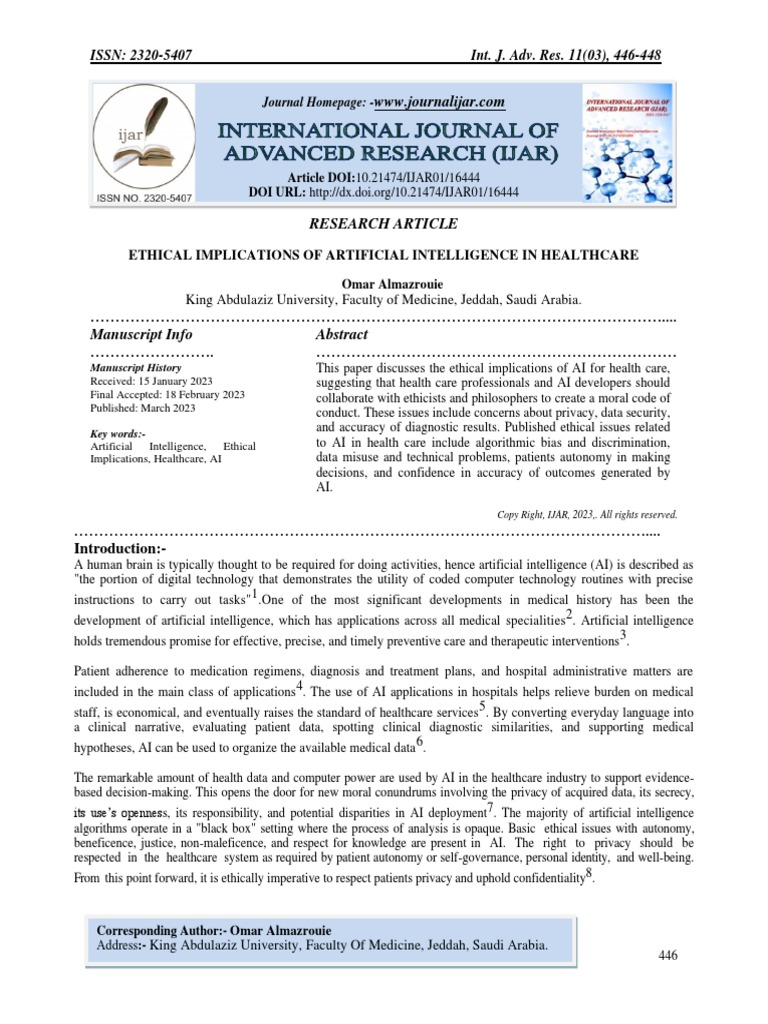The Ethical Implications Of AI Therapy In A Surveillance Society

Table of Contents
Privacy and Data Security Concerns in AI-Powered Mental Healthcare
The use of AI in mental healthcare necessitates the collection and analysis of highly sensitive patient data. This raises serious concerns about privacy and data security.
Data Breaches and the Vulnerability of Sensitive Information
Data breaches are a constant threat in the digital age, and the healthcare sector is particularly vulnerable. The consequences of a breach in an AI therapy platform are especially severe, given the uniquely sensitive nature of mental health data.
- Examples of data breaches: Numerous high-profile data breaches in hospitals and healthcare systems demonstrate the vulnerability of sensitive patient information. Imagine the devastating consequences of a breach exposing intimate details of someone's mental health struggles.
- Sensitivity of mental health data: Mental health information is far more sensitive than many other types of medical data. Its exposure could lead to significant social stigma, discrimination, and even blackmail.
- Potential for identity theft and blackmail: The detailed personal information collected by AI therapy platforms could easily be used for identity theft or malicious purposes, making patients incredibly vulnerable.
Algorithmic Bias and Discrimination in AI Therapy
AI algorithms are trained on data, and if that data reflects existing societal biases, the algorithm will likely perpetuate those biases. This is a significant concern in AI therapy, where biased algorithms could lead to discriminatory treatment of patients.
- Examples of algorithmic bias: We've seen algorithmic bias in areas like loan applications and criminal justice, leading to unfair outcomes. Similar biases in AI therapy could disproportionately affect marginalized communities.
- Importance of diverse datasets: To mitigate bias, AI models must be trained on diverse and representative datasets that accurately reflect the population they serve. This requires careful curation and ongoing monitoring.
- Perpetuating societal inequalities: Biased AI therapy could worsen existing societal inequalities by providing subpar care or misdiagnosing patients from specific demographic groups.
Lack of Transparency and Explainability in AI Decision-Making
Many AI algorithms operate as "black boxes," making it difficult to understand how they reach their conclusions. This lack of transparency poses significant challenges for both patients and clinicians.
- Need for greater transparency: Patients deserve to understand how AI algorithms are making decisions that impact their treatment. This requires greater transparency from developers and clinicians.
- Importance of user understanding and control: Patients should have the ability to understand and control how their data is used and processed by AI therapy tools.
- Implications for patient trust and autonomy: Lack of transparency can erode patient trust and undermine their sense of autonomy in their own treatment.
The Impact of AI Therapy on the Therapeutic Relationship and Patient Autonomy
While AI offers potential benefits, it also raises concerns about the nature of the therapeutic relationship and patient autonomy.
Depersonalization and the Diminishment of Human Connection
The human connection in therapy is crucial for healing and growth. Replacing this connection entirely with an AI risks depersonalizing the experience and diminishing the importance of human empathy.
- Limitations of AI in understanding emotions: AI struggles to fully grasp the nuances of human emotion and experience, leading to potential misinterpretations and inadequate responses.
- Importance of the human therapeutic relationship: The therapeutic relationship is a powerful tool in itself, providing support, validation, and a sense of belonging.
- Risk of patients feeling isolated or misunderstood: Over-reliance on AI could leave patients feeling isolated and misunderstood, potentially hindering their progress.
Informed Consent and the Challenges of AI Transparency
Obtaining truly informed consent is challenging when patients don't fully understand how AI algorithms work or what data is being collected.
- Need for clear information: Patients must receive clear and accessible information about AI therapy tools, including how their data will be used and protected.
- Ethical responsibility of developers and clinicians: Developers and clinicians have a responsibility to ensure that patients provide informed consent, free from coercion or manipulation.
- Potential for manipulation or coercion: The complexity of AI technology can make it difficult for patients to fully understand the implications of using these tools, making them vulnerable to manipulation.
Over-reliance on AI and the Neglect of Traditional Therapies
Over-dependence on AI could lead patients to neglect other crucial aspects of mental health care.
- Benefits of a holistic approach: Mental health care benefits from a holistic approach, incorporating various therapies and support systems.
- AI as a complement, not a replacement: AI should complement, not replace, human therapists and other forms of support.
- Importance of maintaining a balance: Patients should be encouraged to maintain a balance between AI-assisted therapies and other essential aspects of mental health care.
The Surveillance State and the Ethical Use of AI in Mental Health
The integration of AI therapy into a surveillance-heavy society presents unique ethical challenges.
Governmental Access to Patient Data and the Erosion of Privacy
The potential for governments to access and utilize patient data collected by AI therapy platforms raises significant concerns about privacy and the erosion of civil liberties.
- Potential for misuse of information: Sensitive mental health information could be misused for surveillance, political targeting, or other nefarious purposes.
- Implications for freedom of speech and thought: Access to such data could suppress freedom of speech and thought by chilling open discussion of sensitive mental health issues.
- Importance of robust data protection laws: Strong data protection laws and regulations are essential to prevent government overreach and protect patient privacy.
The Potential for AI to be Used for Social Control and Manipulation
AI could be used to identify and target individuals deemed to be a threat to social order based on their mental health status.
- Dangers of stigmatization and discrimination: Such practices would lead to stigmatization and discrimination against individuals with mental health conditions.
- Reinforcement of existing power structures: Biased algorithms could reinforce existing power structures by targeting marginalized groups.
- Need for ethical guidelines and regulations: Robust ethical guidelines and regulations are critical to prevent the misuse of AI in mental health for social control.
Conclusion: Responsible Development and Implementation of AI Therapy
The ethical implications of AI therapy in a surveillance society are profound. Balancing the potential benefits of AI therapy with the need to protect patient privacy, autonomy, and human rights is paramount. Greater transparency, accountability, and regulation in the development and implementation of AI therapy technologies are urgently needed. We must foster open discussions and rigorous research to ensure that AI in mental healthcare serves to improve well-being and not to infringe upon fundamental rights. We urge readers to learn more about the ethical considerations of AI therapy and participate in discussions about responsible AI therapy implementation to protect patient well-being and rights within a surveillance society.

Featured Posts
-
 N Kh L Zakharova Prokommentirovala Rekord Ovechkina
May 15, 2025
N Kh L Zakharova Prokommentirovala Rekord Ovechkina
May 15, 2025 -
 Braves Vs Padres Prediction Atlantas Chances For A Win
May 15, 2025
Braves Vs Padres Prediction Atlantas Chances For A Win
May 15, 2025 -
 Is Betting On The Los Angeles Wildfires A Sign Of The Times An Analysis Of The Current Climate
May 15, 2025
Is Betting On The Los Angeles Wildfires A Sign Of The Times An Analysis Of The Current Climate
May 15, 2025 -
 Exclusive Knicks Fans Unusual Petition To Replace Lady Liberty
May 15, 2025
Exclusive Knicks Fans Unusual Petition To Replace Lady Liberty
May 15, 2025 -
 The Mystery Planet Star Wars 48 Year Old Secret Finally Revealed
May 15, 2025
The Mystery Planet Star Wars 48 Year Old Secret Finally Revealed
May 15, 2025
